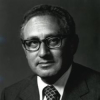Henry A. Kissinger

Henry A. Kissinger
Henry Alfred Kissingeris an American diplomat and political scientist. He served as National Security Advisor and later concurrently as United States Secretary of State in the administrations of presidents Richard Nixon and Gerald Ford. For his actions negotiating the ceasefire in Vietnam, Kissinger received the 1973 Nobel Peace Prize under controversial circumstances, with two members of the committee resigning in protest. Kissinger later sought, unsuccessfully, to return the prize. After his term, his advice has been sought by world leaders...
NationalityGerman
ProfessionStatesman
Date of Birth27 May 1923
CountryGermany
I don't have a brief for every single reaction of Israel, but I think it is important that the political negotiations occur free of the threat of terrorism.
We are doomed to coexist.
In 10 years, there will be no more Israel.
Almost every peace process that has gone on between the Arab side and Israel, the United States has been somewhat isolated because most of the countries in the world, what they really want is to accept the Arab peace plan or so-called peace plan, which in its present form would lead to the destruction of Israel.
The security of Israel is a moral imperative for all free peoples.
A return to the 1967 lines and the abandonment of the settlements near Jerusalem would be such a psychological trauma for Israel as to endanger its survival.
Congress can't do much more damage to us than they already have. To this extent we're liberated to do what is right. ... Our successors will be living in a nightmare if we don't do what is right.
For me, the tragedy of Vietnam was the divisions that occurred in the United States that made it, in the end, impossible to achieve an outcome that was compatible with the sacrifices that had been made, ... Late Edition with Wolf Blitzer.
Ninety percent of all politicians give the other ten percent a bad reputation.
My heart goes out to the president because I've served in an administration that faced a very divided country in a very difficult set of circumstances.
Because of the axiom that guerrillas win if they do not lose, stalemate is unacceptable, ... the military challenge in Iraq is more elusive.
We will go where the facts lead us,
I want to get into the President's head some idea of what he can do. If military actions are recommended to him for decision, I want him to know what he is doing when he decides.
We had a very interesting and positive discussion, and I appreciate the opportunity to meet with several of the key staff members of the governor's staff, ... A few weeks ago I stood with the governor when I spoke about present events and nuclear strategy, and my impression is we share very compatible views.